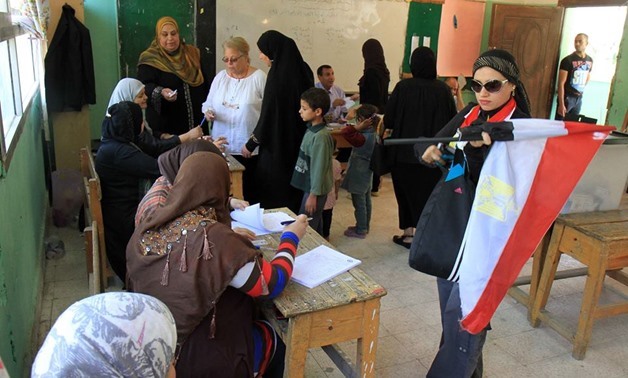
Voters cast their ballots in a polling station during the Egyptian presidential election, May 28, 2014./Egypt Today, Hossam Atef
CAIRO – 22 January 2018: The presidential election is set to begin in 120 days before the end of the current presidential term in March, according to the constitution, raising many questions among Egyptians on candidates that might run for the next presidential election.
On January 20, the National Election Authority (NEA) opened its doors for candidates to present their candidacy documents. Although four candidates have announced their intention to run for the presidency, no one has applied the candidacy documents yet for the election which is set to start on March 26.
The four candidates who announced their intention to apply are President Abdel Fatah al-Sisi, human rights lawyer Khaled Ali, chief of Zamalek ClubMortada Mansour and former Army Chief of Staff Sami Anan.
The final list of the candidates will be announced on February 24, and the deadline for any candidate to retract their candidacy is March 1. The primary results of the first round of the election will be announced on March 29, when decisions on appeals submitted by candidates, if any, will be made.
Speaking to Egypt Today, the NEA’s deputy head Mahmoud el-Sherif announced the measures that will be followed during the elections.
Presidential election schedule states that the voting will be held for three days while the constitution clarifies that the ballot should be conducted in one day unless it is necessary; why is it necessary to hold the ballot in three days?
The constitution sets out one day or more in pursuant of the electoral management’s vision; the National Authority manages the election process and has the right to estimatethe period of time suitable for voting.
The case is that 60 million voters are registered in the electoral roll, and we have nearly around 25,000 subcommittees. Consequently, if we consider the raised electoral awareness among Egyptians, 60 million Egyptians will go for voting. Then, every subcommittee will receive 4,000 voters;however the judge supervising the committee will not be able to receive all 4,000 voters in one day.
Besides, with three days, the authority will facilitate the process for voters, avoiding overcrowding in front of the committees. Therefore, for judges to accomplish their work in the best possible way and to further encourage Egyptians to take part in the election process, the authority has set three days for the elections.
Some have criticized the presidential elections' schedule, describing it as stressful, what do think of that?
When the authority started preparing the schedule, it abided by the constitutional deadline according to the Article 140, stipulating that presidential election measures shall begin in 120 days before the end of the current presidential term, and the result shall be declared in a month before the end of the term.
Therefore, we should consider that 120 days include 24 days from opening the doors of candidacy for receiving, and adjudicating the election-related disputes, complaints, objections and appealing them. My point of view is that the schedule is very suitable and not stressful, as the authority has considered the legal and constitutional deadline.
What are the measures that the National Authority has implemented so far in accordance with presidential electoral time line on the ground?
We have taken several important steps;the National Authority has declared presidential electoral timetable and invited voters for the ballot, and the real estate registration offices across Egypt started to receive citizens who wish to fill in candidacy endorsement forms to any candidate they wish to support.
Around 389 real estate offices have already contacted the operations room at the Ministry of Justice, ensuring that the offices have welcomed citizens to fill in the form.
What would happen if the candidates were not able to collect required signatures due to time constraints and many other different reasons and only one candidate could run for the election?
This is an important question, but I ascertain Egyptians that we would deal with this situation in accordance with the constitution, stating that a candidate should have 5 percent of restricted votes, equivalent to three million votes, in the presidential schedule.
If a candidate could not obtain this percentage, what are the legal measures that should be taken in this case?
In this case, the elections would be repeated within 15 days of declaring the results.
Has any of the candidates presented his candidacy documents and complied with the specifications so far?
Until now, no one has presented the candidacy documents yet; any person has the right to run. I confirm that the committee performs its duties with transparency and in favor of the national interests.
What do you want to tell people who are concerned about the lack of impartiality?
I want to tell them that the committee works with impartiality and honesty, and that the election willbe completely fair. We will not allow any manipulations, and I want to assure all Egyptians that the National Authority works for the national interests and for making the elections suitable for the prominent position of Egypt.


Comments
Leave a Comment